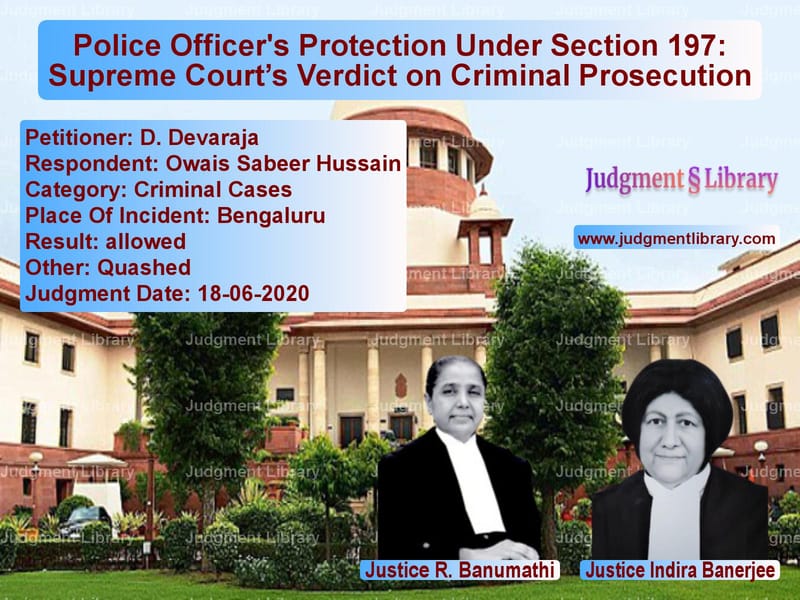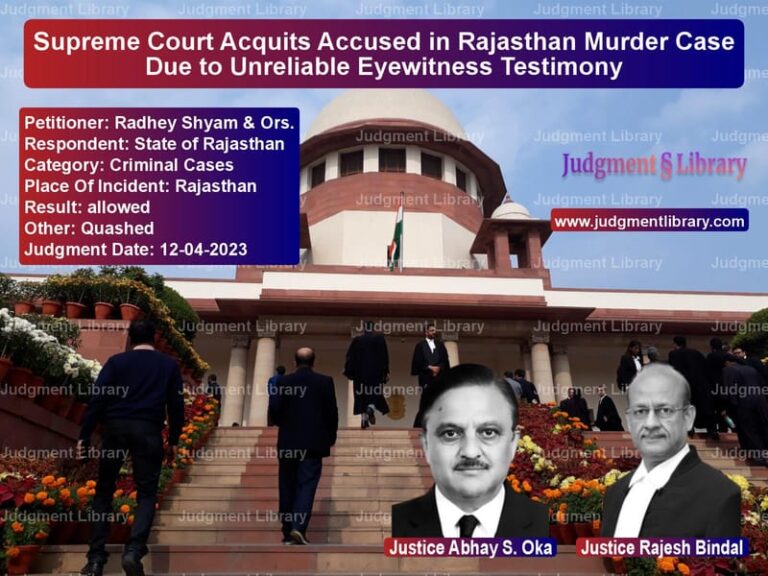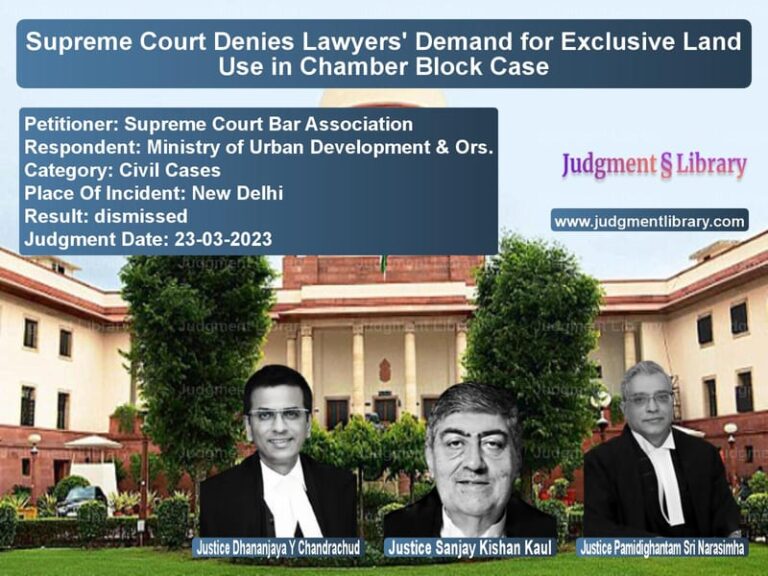Police Officer’s Protection Under Section 197: Supreme Court’s Verdict on Criminal Prosecution
The case of D. Devaraja vs. Owais Sabeer Hussain raises critical legal questions regarding the protection of police officers from prosecution under Section 197 of the Code of Criminal Procedure. The Supreme Court’s ruling in this matter establishes an important precedent in defining the scope of protection granted to public servants and the conditions under which they may be prosecuted for alleged offenses committed in the course of their official duties.
Background of the Case
The appellant, D. Devaraja, was a police officer serving as Deputy Commissioner of Police (Crime), Bengaluru, at the time of the incident. The dispute arose when the appellant was accused of unlawful detention, custodial torture, and other offenses under various sections of the Indian Penal Code (IPC), including Sections 120-B, 220, 323, 330, 348, and 506B. The allegations were brought forward by the respondent, Owais Sabeer Hussain, in a private complaint.
The Additional Chief Metropolitan Magistrate (ACMM), Bengaluru, took cognizance of the private complaint and directed the case to proceed. The appellant subsequently filed a petition under Section 482 of the Code of Criminal Procedure (CrPC) before the Karnataka High Court, seeking to quash the complaint on the grounds that prior government sanction was required for prosecution under Section 197 of CrPC and Section 170 of the Karnataka Police Act, 1963.
The Karnataka High Court refused to quash the complaint but granted the appellant the liberty to apply for discharge under Section 245 of CrPC. Dissatisfied with this ruling, the appellant moved the Supreme Court.
Legal Issues Before the Supreme Court
- Whether prior sanction under Section 197 of CrPC and Section 170 of the Karnataka Police Act, 1963 was required before prosecuting a police officer for alleged offenses committed in the course of duty.
- Whether the High Court erred in remitting the case back to the trial court instead of quashing the complaint.
- The scope of protection granted to public servants under Section 197 of CrPC and whether custodial violence or excesses by the police can fall within the ambit of official duty.
Petitioner’s Arguments
The appellant’s counsel, Mr. Saajan Poovayya, made the following submissions:
- Government sanction was mandatory: The complaint should have been quashed at the outset because no prior sanction was obtained under Section 197 of CrPC or Section 170 of the Karnataka Police Act. The accused was a police officer performing his duty, and without such sanction, the prosecution was not legally maintainable.
- No specific allegations against the appellant: The appellant was not the investigating officer but was only a supervising officer. There was no direct evidence to establish his role in any alleged custodial torture or unlawful detention.
- Habeas Corpus proceedings had already been dismissed: The respondent’s father had previously filed a Habeas Corpus petition in the Karnataka High Court alleging illegal detention, which was dismissed after finding no evidence of police excesses. Since the allegations had already been examined and dismissed, the present complaint was frivolous.
- The High Court should have quashed the complaint: Instead of directing the appellant to apply for discharge under Section 245 of CrPC, the High Court should have quashed the proceedings outright.
Respondent’s Arguments
The respondent’s counsel, Mr. Sidharth Luthra, countered these arguments with the following points:
- Custodial violence is not part of official duty: The allegations against the appellant were of custodial torture and abuse of power, which cannot be considered acts done in the course of official duty. Therefore, no prior sanction was necessary.
- High Court’s decision was correct: The High Court was justified in allowing the appellant to apply for discharge under Section 245 of CrPC instead of quashing the proceedings outright.
- Seriousness of the allegations: The respondent had suffered illegal detention and torture, and such allegations should be examined during the trial rather than dismissed at the preliminary stage.
Supreme Court’s Observations
The Supreme Court examined the legal provisions and past precedents before ruling on the matter. The Court made the following key observations:
- Section 197 of CrPC protects public servants: The purpose of requiring prior sanction is to prevent vexatious litigation against public servants acting in the discharge of their official duties.
- Scope of official duty: The Court noted that if an act is done in the course of duty, even if it involves an excess of power, prior sanction is required before prosecution. However, if an act is entirely unconnected with duty, no sanction is necessary.
- The allegations were related to duty: The Court found that the allegations against the appellant pertained to actions taken in the course of investigation, even if there were allegations of excesses. Therefore, sanction was necessary.
- The High Court erred: The High Court’s decision to remand the case to the trial court instead of quashing the complaint was incorrect. Since there was no prior sanction, the proceedings were unsustainable.
Final Judgment
The Supreme Court ruled in favor of the appellant, holding that:
- The proceedings against the appellant were quashed for lack of prior sanction.
- The High Court’s direction to the appellant to seek discharge under Section 245 of CrPC was incorrect.
- The case was dismissed outright as being legally untenable.
Key Takeaways from the Judgment
- Protection under Section 197 of CrPC is broad: Police officers and other public servants are protected from prosecution for acts done in the course of their official duties unless prior government sanction is obtained.
- Excesses in official duty still require sanction: Even if an officer exceeds their authority, if the act is connected to their duty, prosecution cannot proceed without sanction.
- Court intervention at the preliminary stage: The Supreme Court reinforced that frivolous complaints against public officials should be quashed at the initial stage to prevent harassment.
Conclusion
The Supreme Court’s ruling in this case reinforces the legal safeguards provided to public servants against vexatious litigation. While ensuring that genuine cases of misconduct are prosecuted, the judgment prevents misuse of legal provisions to harass officials performing their duties. This decision will have a lasting impact on cases involving police officers accused of wrongdoing in the line of duty.
Petitioner Name: D. Devaraja.Respondent Name: Owais Sabeer Hussain.Judgment By: Justice R. Banumathi, Justice Indira Banerjee.Place Of Incident: Bengaluru.Judgment Date: 18-06-2020.
Don’t miss out on the full details! Download the complete judgment in PDF format below and gain valuable insights instantly!
Download Judgment: D. Devaraja vs Owais Sabeer Hussain Supreme Court of India Judgment Dated 18-06-2020.pdf
Direct Downlaod Judgment: Direct downlaod this Judgment
See all petitions in Custodial Deaths and Police Misconduct
See all petitions in Bail and Anticipatory Bail
See all petitions in Judgment by R. Banumathi
See all petitions in Judgment by Indira Banerjee
See all petitions in allowed
See all petitions in Quashed
See all petitions in supreme court of India judgments June 2020
See all petitions in 2020 judgments
See all posts in Criminal Cases Category
See all allowed petitions in Criminal Cases Category
See all Dismissed petitions in Criminal Cases Category
See all partially allowed petitions in Criminal Cases Category







